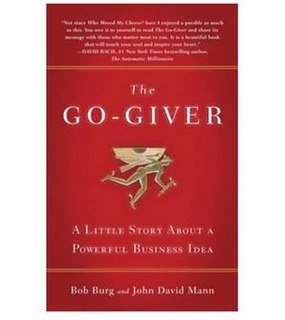A Quote by Stephen A. Schwarzman
Doing a me-too business, because it's you - the only person who cares about that is you. The market doesn't care if it's you. The market is pretty much being served. You better have something that the world doesn't have, because even then, you might screw it up through your own ineptitude and inexperience.
Related Quotes
You can be the smartest person in the world - which Bill Clinton is, and if he's not, his wife is - and care more than anybody else in the world - which he does, I don't doubt that for a minute. And you can care so much that you're willing to be dishonest - you can tell people one thing but do another because you really know it's for their own good. And you'll still screw it all up. Because the whole premise of what you're doing is wrong!
You can keep raising it, but at some point, everybody who believes in a minimum wage will say, "No, wait a minute. That's too much," and at that point, you have demonstrated that that there's no market relationship. You're just talking emotion. You're just talking "fairness." You're just talking being nice, and that's not how the market works. People aren't paid a wage because they're being nice to, or because it's fair. In the market, the market rules.
"No one is doing what we're doing." This is a bummer of a lie because there are only two logical conclusions. First, no one else is doing this because there is no market for it. Second, the entrepreneur is so clueless that he can't even use Google to figure out he has competition. Suffice it to say that the lack of a market and cluelessness is not conducive to securing an investment. As a rule of thumb, if you have a good idea, five companies are going the same thing. If you have a great idea, fifteen companies are doing the same thing.
An old market had stood there until I'd been about six years old, when the authorities had renamed it the Olde Market, destroyed it, and built a new market devoted to selling T-shirts and other objects with pictures of the old market. Meanwhile, the people who had operated the little stalls in the old market had gone elsewhere and set up a thing on the edge of town that was now called the New Market even though it was actually the old market.
What's fascinating . . .is that you could now have a business that might have been selling for $10 billion where the business itself could probably not have borrowed even $100 million. But the owners of that business, because its public, could borrow many billions of dollars on their little pieces of paper- because they had these market valuations. But as a private business, the company itself couldn't borrow even 1/20th of what the individuals could borrow.
Generally, the technology that enables disruption is developed in the companies that are the practitioners of the original technology. That's where the understanding of the technology first comes together. They usually can't commercialize the technology because they have to couple it with the business model innovation, and because they tend to try to take all of their technologies to market through their original business model, somebody else just picks up the technology and changes the world through the business model innovation.
The correct attitude of the security analyst toward the stock market might well be that of a man toward his wife. He shouldn't pay too much attention to what the lady says, but he can't afford to ignore it entirely. That is pretty much the position that most of us find ourselves vis-à-vis the stock market.
And maybe the cereal makers by and large have learned to be less crazy about fighting for market share-because if you get even one person who's hell-bent on gaining market share.... For example, if I were Kellogg and I decided that I had to have 60% of the market, I think I could take most of the profit out of cereals. I'd ruin Kellogg in the process. But I think I could do it.

































